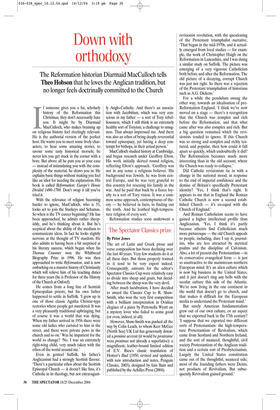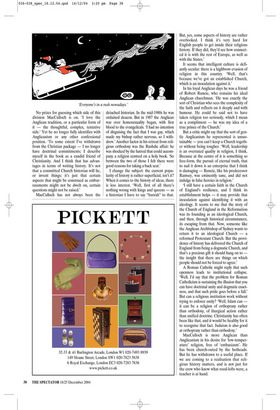Down with orthodoxy
The Reformation historian Diarmaid MacCulloch tells Theo Hobson that he loves the Anglican tradition, but no longer feels doctrinally committed to the Church If someone gives you a fat, scholarly history of the Reformation this Christmas, they don’t necessarily hate you. It might be by Diarmaid MacCulloch, who makes braining up on religious history feel rivetingly relevant. He is the authorial version of the perfect host. He wants you to meet some lively characters, to hear some amazing stories, to savour some tasty historical morsels; he never lets you get stuck in the corner with a bore. But above all he puts you at your ease — instead of intimidating you with the complexity of the material, he draws you in. He explains basic things without making you feel like an idiot for needing the explanation. His book is called Reformation: Europe’s House Divided 1490–1700. Don’t swap it till you’ve tried it.
With the relevance of religion becoming harder to ignore, MacCulloch, who is 53, looks set to join the Starkeys and Schamas. So when is the TV career beginning? He has been approached, he admits rather sheepishly, and he’s thinking about it. But he’s sceptical about the ability of the medium to communicate ideas. In fact he looks slightly nervous at the thought of TV stardom. He also admits to having been a bit surprised at his literary success, which began when his Thomas Cranmer won the Whitbread Biography Prize in 1996. He was then approached to write Reformation, and is now embarking on a massive history of Christianity which will relieve him of his teaching duties for three years (he is Professor of the History of the Church at Oxford).
He comes from a long line of Scottish Episcopalian priests, but his own father happened to settle in Suffolk. ‘I grew up in one of those classic Agatha Christie-type rectories where people get murdered. It was a very pleasantly traditional upbringing, but of course it was a world that was dying. When my father arrived in 1956 there were some old ladies who curtsied to him in the street, and there were private pews in the church and so on.’ Was he impatient for the world to change? ‘No. I was an extremely right-wing child, very much taken with the ethos of the world around me.’ Even in genteel Suffolk, his father’s Anglicanism had a strongly Scottish flavour. ‘There’s a particular ethos about the Scottish Episcopal Church — it doesn’t like fuss, it’s Catholic in its theology, but not extravagant ly Anglo-Catholic. And there’s an association with Jacobitism, which was very conscious in my father — a sort of Tory rebelliousness, which I still think is an extremely healthy sort of Toryism; a challenge to smugness. That always impressed me. And there was also an ethos of being deeply reverential toward episcopacy, yet having a deep contempt for bishops, in their actual person.’ MacCulloch studied history at Cambridge, and began research under Geoffrey Elton. His work initially skirted round religion, reflecting Elton’s approach. ‘Geoffrey was not in any sense a religious believer. His background was Jewish; he was from central Europe, and he was very grateful to this country for rescuing his family in the war. And he paid that back by a fierce loyalty to a sort of Tory vision. It was a common sense approach, contemptuous of theory — he believed in facts, in finding out the truth. And he loathed high-temperature religion of every sort.’ Reformation studies soon underwent a revisionist revolution, with the questioning of the Protestant triumphalist narrative. ‘That began in the mid-1970s, and it actually emerged from local studies — for example, the work of Christopher Haigh on the Reformation in Lancashire, and I was doing a similar study on Suffolk. The picture was emerging of a very vigorous Catholicism both before and after the Reformation. The old picture of a decaying, corrupt Church was just not right. So there was a rejection of the Protestant triumphalism of historians such as A.G. Dickens.’ For a while the pendulum swung the other way, towards an idealisation of preReformation England. ‘I think we’ve now moved on a stage — there’s a recognition that the Church was complex and rich before the Reformation, and that what came after was also complex and rich. But a big question remained which the revisionists tended to ignore. If this Church was so strong and complex and richly textured, and popular, then how could it fall apart so quickly, which undoubtedly it did? The Reformation becomes much more interesting than in the old account, where the Church was ready to collapse.’ Did Catholic revisionism tie in with a change in the national mood, in response to the end of imperial confidence and the demise of Britain’s specifically Protestant identity? ‘Yes, I think that’s right. It appears to me that in England the Roman Catholic Church is now a second established Church — it’s co-equal with the Church of England.’ And Roman Catholicism seems to have gained a higher intellectual profile than Anglicanism. ‘Yes, I think it’s partly because atheists find Catholicism much more picturesque — the old Church appeals to people, including, dare I say it, journalists, who are less attracted by metrical psalms and the discipline of Calvinism. Also, a lot of present-day Protestantism —in its conservative evangelical form — is just so unattractive to the mainstream northern European mind. It’s an alien culture which is now big business in the United States, and it just doesn’t ring any bells with the secular culture this side of the Atlantic. We’re now living in the one continent in the world that doesn’t go to church, and that makes it difficult for the European media to understand the Protestant mind.’ But surely American fundamentalism grew out of our own culture, or an aspect that we exported back in the 17th century? ‘I suppose that we exported two different sorts of Protestantism: the high-temperature Protestantism of Revivalism, which came from Scotland and Northern Ireland, and the sort of nuanced, thoughtful, civil society Protestantism of the Anglican tradition and a certain sort of Presbyterianism. Largely the United States constitution came out of the thoughtful, nuanced side; most of the founding fathers were Deists, not products of Revivalism. But subsequently Revivalism gained ground.’ No prizes for guessing which side of this division MacCulloch is on. ‘I love the Anglican tradition, or a particular form of it — the thoughtful, complex, tentative side.’ Yet he no longer fully identifies with Anglicanism or any other confessional position. ‘To some extent I’ve withdrawn from the Christian package — I no longer have doctrinal commitments; I describe myself in the book as a candid friend of Christianity. And I think that has advantages in terms of writing history. It’s not that a committed Church historian will lie, or invent things; it’s just that certain aspects that might be construed as embarrassments might not be dwelt on, certain questions might not be raised.’ MacCulloch has not always been the detached historian. In the mid-1980s he was ordained deacon. But in 1987 the Anglican war over homosexuality began, with first blood to the evangelicals. ‘I had no intention of disguising the fact that I was gay, which made my bishop rather nervous, so I withdrew.’ Another factor in his retreat from religious orthodoxy was the Rushdie affair: he was shocked by the hatred that could accompany a religion centred on a holy book. ‘So between the two of those I felt there were good reasons for taking a back seat.’ I change the subject: the current popularity of history is rather superficial, isn’t it? When it comes to the history of ideas, there is less interest. ‘Well, first of all there’s nothing wrong with kings and queens — as a historian I have to say “hurrah” to that. But, yes, some aspects of history are rather overlooked. I think it’s very hard for English people to get inside their religious history. If they did, they’d see how connected it is with the rest of Europe, as well as with the States.’ It seems that intelligent culture is defiantly secular: there is a highbrow evasion of religion in this country. ‘Well, that’s because we’ve got an established Church, which is an inoculation against it.’ In his loyal Anglican days he was a friend of Robert Runcie, who remains his ideal Anglican churchman. ‘He was exactly the sort of Christian who sees the complexity of the faith and reflects on it deeply and with humour. He could be said not to have taken religion too seriously, which I mean as a compliment — he was my idea of a true prince of the Church.’ But a critic might say that the sort of gentle Anglicanism he represented is unsustainable — you can’t keep a Church together without being tougher. ‘Well, leadership is an overrated quality in religion, I think. Because at the centre of it is something so free-form, the pursuit of eternal truth, that to nail it down is an enterprise that I think is damaging — Runcie, like his predecessor Ramsey, was eminently sane, and did not indulge in false heroics in religion.’ ‘I still have a certain faith in the Church of England’s resilience, and I think its establishment helps — it may provide that inoculation against identifying it with an ideology. It seems to me that the story of the Church of England in the Reformation was its founding as an ideological Church, and then, through historical circumstances, its escaping from that. Now, someone like the Anglican Archbishop of Sydney wants to return it to an ideological Church — a reformed Protestant Church. But the providence of history has delivered the Church of England from being a dogmatic Church, and that’s a precious gift it should hang on to the insight that there are things on which people should not be forced to agree.’ A Roman Catholic might reply that such openness leads to institutional collapse. ‘Well, I’d say that the problem for Roman Catholicism is sustaining the illusion that you can have doctrinal unity and dogmatic exactness, and that such pride goes before a fall.’ But can a religious institution work without trying to enforce unity? ‘Well, Islam can it can be a religion of orthopraxy rather than orthodoxy, of liturgical action rather than unified doctrine. Christianity has often been like that, and it would be healthy for it to recognise that fact. Judaism is also good at orthopraxy rather than orthodoxy.’ MacCulloch is more Anglican than Anglicanism in his desire for ‘low-temperature’ religion, free of ‘enthusiasm’. He has been church-outed by the hotheads. But he has withdrawn to a useful place. If we are coming to a realisation that religious history matters, and is not just for the crew who know what rood-lofts were, a teacher is at hand.


















































































 Previous page
Previous page